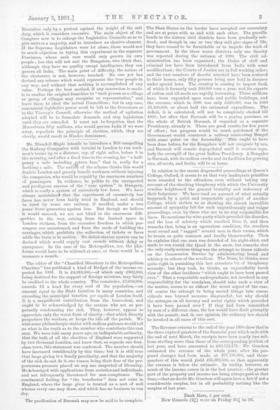Mr. Minden-Maple intends to introduce a Bill compelling 'the Railway
Companies with termini in London to run work- meen's trains up to a distance, say, of eight miles, before 8 in the morning, and after a fixed time in the evening, for "a half- :penny a mile including zturn fare," that is, really for a farthing a mile. The autlitr. of the scheme thinks this would eleplete London and greatly benefit workmen without injuring the companies, who would be repaid by the enormous numbers 'of passengers. In evidence, he poitits to the unexpected and prodigious success of the "zone system" in Hungary, which is really a system of excessively low fares. We have always maintained' that the experiment of excessively low :fares has never been fairly tried in England, and should be tried by some one railway, if needful, under a two years' State guarantee against loss. But though we believe it would succeed, we are not blind to the enormous diffi- leulties in the way, arising from the limited space in London stations, from the excessive freedom to which pas- sengers are accustomed, and from the mode of building the -carriages, which prohibits the collection of tickets or fares while the train is in motion. No ticket-station system can be devised which would supply vast crowds without delay or annoyance. In the case of the Metropolitan, too, the plat- forms would have to be widened at once, or there would be a massacre a month.














































 Previous page
Previous page